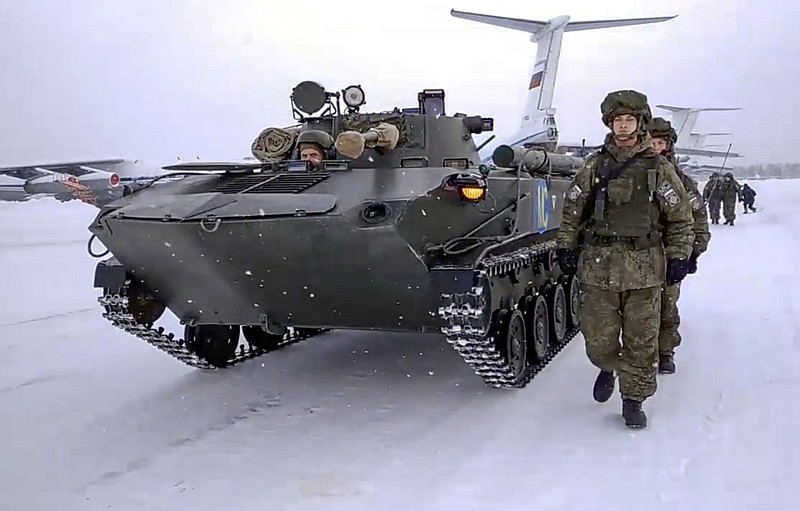MOSCOW -- A top law enforcement official in Kazakhstan said Saturday that 225 people died during the violent demonstrations that shook the country this month, a higher number than previously announced.
Serik Shalabayev, head of the criminal prosecution service in the general prosecutor's office, said 19 police officers or service members were among the dead. More than 4,300 people were injured, he said.
The previous official death toll was 164.
The demonstrations started Jan. 2 in the oil- and gas-rich Central Asian nation after a sharp rise in fuel prices. The movement quickly spread nationwide, became a general protest against the country's authoritarian government and descended into violence, especially in Almaty, the country's largest city.
Groups of armed men appeared in Almaty, with some seen riding in cars without license plates or with their faces covered. Marchers at the peaceful protests said these men began urging them to storm government buildings, promising to give them guns.
Clashes with police soon broke out, and by the night of Jan. 5, Almaty was in chaos. City Hall was burning, as were cars and buses; stores were looted; and attempts were made to storm the presidential residence. Gunshots were heard in the streets, the internet was blacked out, and the airport was briefly seized.
At the request of President Kassym-Jomart Tokayev, the Russia-led Collective Security Treaty Organization sent a force of more than 2,000 soldiers, mostly Russians, to act as peacekeepers. The Russian Defense Ministry said Saturday that its troops had returned home, but it was unclear whether forces from other alliance countries remained in Kazakhstan.
Tokayev has blamed the unrest on "terrorists" who received foreign training and support. But nearly two weeks after the events that led to about 16,000 arrests, the government has not presented any evidence to support its allegation of outside involvement.
Some analysts saw the blaming of foreign instigators as a pretext for bringing in the mostly Russian forces.
"In order to invite Russian troops, you need a serious reason ... that is not an internal standoff with the people," political analyst Dimash Alzhayev said in an interview. "So naturally, [the authorities] needed to come up with terrorists."
It remains unclear whether the more violent actors were individuals taking advantage of the mayhem to loot and vandalize stores, or if they were part of organized groups with larger political motives.
Protesters, however, say their rallies were somehow undermined, leading to the crackdown by security forces. Tokayev has said authorities didn't use force at peaceful demonstrations.
A protester whose first name is Bezshan said that on Jan. 5, armed men approached and asked young people in the crowd to help them storm a police station.
"They said they would hand out weapons," he said, recalling the incident more than a week later. The Associated Press has chosen not to publish the full names of protesters interviewed out of caution for their security.
Beken, another protester, said he saw "provocateurs" at the rally that day, urging an attack on police.
"We tried to stop them as much as we could, telling them, 'Everyone, stay put,'" he said. "We don't need weapons; we came out to a peaceful rally."
On Jan. 6, security forces opened fire and killed dozens of protesters. At least 12 officers also were reported killed. The next day, Tokayev announced that he had given security forces shoot-to-kill orders to halt the unrest, saying, "We intend to act with maximum severity regarding lawbreakers."
Almaty police spokeswoman Saltynat Azirbek called the Jan. 5 attack on the Police Department "a proper battle."
The attackers "didn't put forward any demands," she told reporters. "They deliberately came to destroy, to kill."
She also said police were unarmed when working at unsanctioned demonstrations in Almaty, but she didn't clarify whether she meant the Jan. 6 rally.
Information for this article was contributed by Kirill Zarubin, Dasha Litvinova and staff members of The Associated Press.
